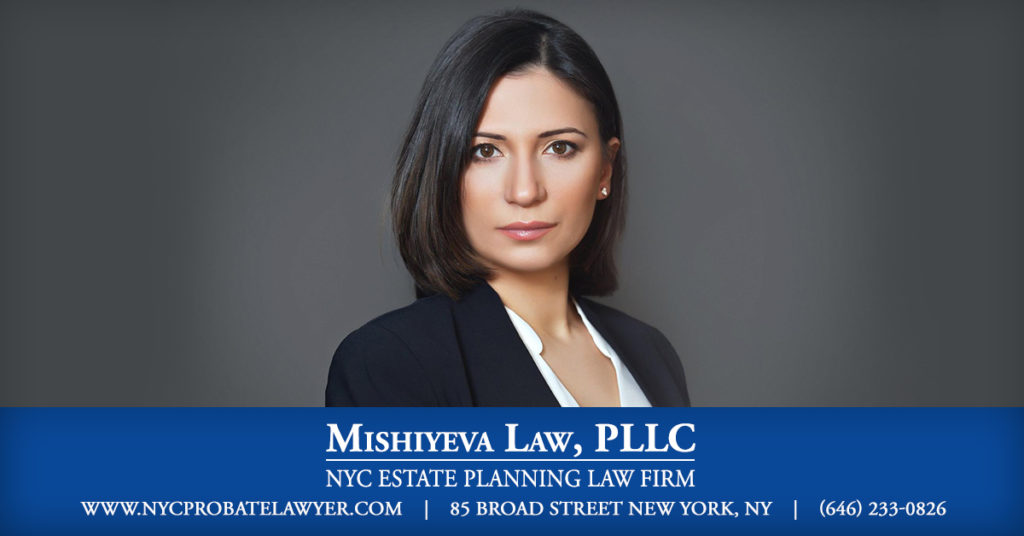What is a probate lawyer and what do they do?

The Main Objective of a Probate Law Firm
Most people turn first to the Surrogate’s Court for assistance after someone dear passes away. If the matter is complicated or the estate is substantial, the clerk will almost always advise the individual to contact a probate lawyer. For small estate matters (under $25,000) you can typically proceed on your own. To help you understand why a probate lawyer may be necessary for a successful administration, you need to first ask yourself this: What does a probate lawyer do? Before you go out and hire any lawyer, take a step back to assess why you need a probate lawyer as opposed to a general practice lawyer. Identify your goals and make sure that the attorney you retain is capable and experienced with such matters.
If your goal is to lawfully administer an estate or defend the validity of a will, here are some key takeaways about New York probate lawyers you should learn and some pitfalls you can learn to avoid:
What Does a Probate Lawyer Do?
Aside from litigation, some of the services you should expect your NY probate lawyer to provide are as follows:
- File all necessary documents for your appointment as the official executor or administrator (no will) of the estate;
- Locate all assets of the deceased;
- Retain appraisal services for real property and/or personal property of the estate;
- Collect life insurance proceeds;
- Set up an estate account with a financial institution;
- Transfer the deceased’s financial accounts into an estate bank account;
- Negotiate and/or dispute claims made against the estate by creditors of the deceased;
- File tax returns;
- Compromise and settle disputes with executors, administrators, and heirs;
- Ensuring the sale of real property;
- Negotiate with Medicaid (if applicable);
- Defend against a will contest;
- Prepare an accounting of all assets and disbursements;
- Calculate executor or administrator commission fees;
- Distribute of proceeds to beneficiaries.
Watch Out for Pitfalls
Pretty much every general practice lawyer out there would like to be retained by you to administer the estate? Why? Because the legal fees associated with an estate matter can be substantial. In theory, hiring a general practice attorney should make things easier for you—you can go to that law office that you pass on the way to and from work. But actually, hiring any lawyer without doing much due diligence is often a bad idea.
Fees on a Percentage Basis
This is not to say that all contingency fee agreements are a bad idea. Such an agreement may make sense given the circumstances. However, if you are agreeing to a contingency fee agreement, make sure that your retainer agreement specifically states that the law firm will be involved from inception to end, not just upon letters testamentary or administration issuing. It is terribly unfortunate how many times clients are duped into paying tens of thousands of dollars for the lawyer to file a handful of documents nothing further.
Holding Estate Funds in Escrow
Once you are officially appointed as administrator or executor by Surrogate’s Court, your probate lawyer should direct you to open an estate bank account. If you sell a real property of the estate or close out the decedent’s bank accounts, those proceeds should be deposited into an estate bank account, not the attorney’s escrow account! Entrusting your attorney with hundreds of thousands of dollars is risky. Although most lawyers are ethical and abide strictly by the rules, your attorney might turn out to be that bad apple that spoils the bunch.
Hire a Reputable NY Estate Lawyer
Don’t make the mistake of hiring just anyone with a law license with your estate matter. Google the lawyer’s website to learn about the service they provide. Is estate law listed? If so, are twenty other different areas of law listed as well? If you can’t find the practice area on their website or they’ve listed everything under the sun, move on. Also, be wary of lawyers who have no online presence. Every law firm should have a website to educate potential clients about their services and provide a means of contact. As a nominated executor in a will, or if you are seeking to become appointed as administrator, you owe a duty to the heirs and the estate to hire a competent legal professional.
Why Retain a Probate Lawyer?
The duties of a probate lawyer are vast and diverse. To summarize our main objective, we help executors and estate administrators open and settle the estate of a deceased person. We also assist beneficiaries and personal representatives in settling the final affairs of loved ones.
In the case of estate litigation, you need a probate lawyer on your team. The most common scenario for an estate litigator is when heirs start fighting over an estate, or a will contest ensues. In such matters, you can expect depositions and possibly a trial. If you are anticipating conflict, contact a probate lawyer as soon as possible to discuss your concerns.
With the right attorney at your side, you can expect tremendous support from the moment the decedent passes away to the finalization of their estate and distribution of assets to the appropriate heirs. With the wrong attorney, things can go terribly wrong.
You should also be aware it is in the attorney’s interest to close out the estate as quickly as possible. The reason is because although an attorney will take an initial retainer fee upfront, the majority of their compensation depends on the conclusion of the estate administration. Typically estates take at least seven months to close out because the court system allows creditors enough time to make a claim on any outstanding debt. Once that seven month period is over, don’t be surprised to see your lawyer moving very quickly.